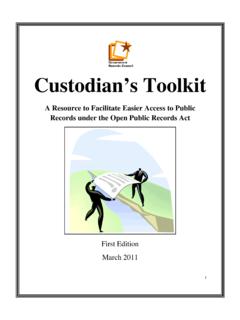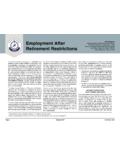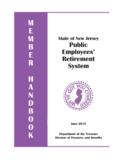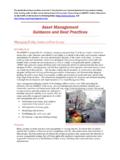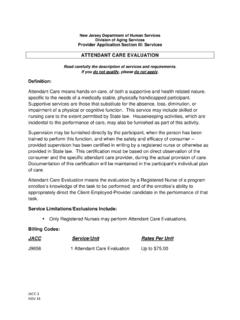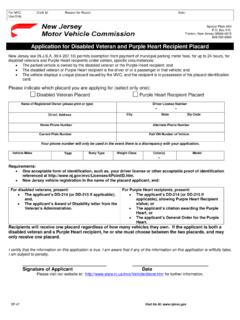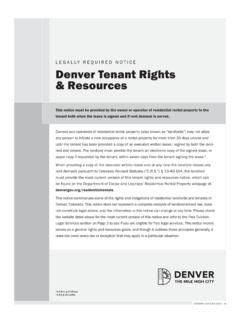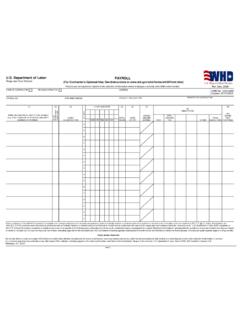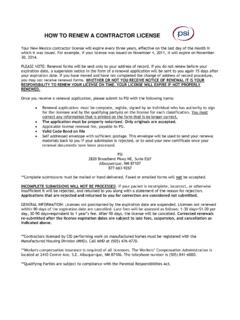Transcription of New Jersey Department of Community Affairs Division of ...
1 New Jersey Department of Community Affairs Division of Codes and Standards Landlord-Tenant Information Service GROUNDS FOR AN EVICTION BULLETIN Updated February 2008 An eviction is an actual expulsion of a tenant out of the premises. A landlord must have good cause to evict a tenant. There are several grounds for a good cause eviction. Each cause, except for nonpayment of rent, must be described in detail by the landlord in a written notice to the tenant. A notice to Quit is required for all good cause evictions, except for an eviction for nonpayment of rent. A notice to Quit is a notice given by the landlord ending the tenancy and telling the tenant to leave the premises. However, a Judgment for Possession must be entered by the Court before the tenant is required to move. A notice to Cease may also be required in some cases. A notice to Cease serves as a warning notice ; this notice tells the tenant to stop the wrongfully conduct.
2 If the tenant does not comply with the notice to Cease, a notice to Quit may be served on the tenant. After giving a notice to Quit, the landlord may file suit for an eviction. If a suit for eviction is filed and the landlord wins his case, he may be granted a Judgment for Possession. A Judgment for Possession ends the tenancy and allows the landlord to have the tenant evicted from the rental premises. No residential landlord may evict or fail to renew a lease, whether it is a written or an oral lease without good cause. The landlord must be able to prove in court that he has grounds for an eviction. This bulletin outlines the good cause grounds for an eviction of a tenant from residential rental properties in New Jersey , pursuant to the Anti-Eviction Act, as set forth in 2 The Anti-Eviction Act was created to protect blameless tenants from eviction and was adopted in recognition of the housing shortage in the State.
3 APPLICABILITY This law applies to most residential rental properties including: single-family homes, mobile homes and land in a mobile home park, and apartment buildings and complexes. This law also applies to rooming and boarding homes. EXCEPTIONS This law may not apply to two or three unit owner-occupied premises with two (2) or fewer rental units. It does not apply to hotel guests, motel guests or guest houses rented to a transient guest or seasonal tenant. However, hotel and motel guests are covered under this law if, they have no other home and live at the hotel or motel on a continual basis. Additionally, this law does not apply to a unit held in trust on behalf of a member of the immediate family, if that family member is developmentally disabled, and permanently occupies the dwelling unit. GROUNDS FOR EVICTION a. Failure to Pay Rent If a tenant fails to pay rent, the landlord may immediately take legal action to have the tenant evicted.
4 The landlord is not required to give the tenant notice before filing an eviction suit, except if the tenant resides in federally subsidized housing. If the tenant resides in federally subsidized housing a 14- day notice must be given before filing a suit for eviction. Note: A tenant may not be evicted for nonpayment of rent, if the tenant used the unpaid portion of rent to continue utility services to the rental premises after receiving notice that the services were in danger of being discontinued, and if the landlord was responsible for the payment of those utility services and did not make the payments required to retain the use of those services. These utilities include: electric, gas, water and sewer. The money used to pay for the continuance of those services shall be considered part of the rent payment. b. Disorderly Conduct If after given written notice to Cease disorderly conduct, the tenant continues the disorderly conduct and that conduct destroys the peace and quiet of the other tenants living in the house or neighborhood, the landlord may file a suit for eviction.
5 A notice to Quit must be served on the tenant at least three days prior to filing a suit for eviction. c. Damage or Destruction to the Property The tenant may be evicted if he has intentionally or by reason of gross negligence caused or allowed destruction, damage or injury to the property. A notice to Quit must be served on the tenant at least three days prior to filing a suit for eviction. d. Substantial Violation or Breach of the Landlord s Rules and Regulations If after given a written notice to Cease violating or breaching reasonable rules and regulations contained in the lease or accepted in writing by the tenant, the tenant continues to substantially violate or breach the rules and regulations, the landlord may file a suit for eviction. A notice to Quit must be served on the tenant at least one month prior to filing the suit for eviction. In addition, any notices must be given on or before the start of a new month.
6 E. Violation or Breach of Covenants or Agreements Contained in the Lease 1) If the tenant continues to substantially violate or breach the reasonable covenants or agreements contained in the lease, after given written notice to Cease violating or breaching those covenants or agreements and if the landlord has reserved a right of re-entry in the lease, the landlord may file a suit for eviction. A notice to Quit must be served on the tenant at least one month prior to filing the suit for eviction. 2) In public housing, if the tenant has substantially violated or breached any of the covenants or agreements contained in the lease, pertaining to illegal uses of controlled dangerous substances, or other illegal activities, the landlord may file a suit for eviction. The covenant or agreement must conform to federal guidelines and must have been in effect at the beginning of the lease term.
7 The landlord does not have to give notice to Cease the illegal activity before filing for a notice to Quit. A notice to Quit must be served on the tenant in accordance with federal regulations pertaining to public housing. Note: A public housing authority may evict a tenant when a member of the tenant s household or guest engages in drug-related activity, even if the tenant did not know of the drug related activity. Dept. of Housing and Urban Development v. Rucker, 122 1230 (2002). f. Failure to Pay Rent Increase If a tenant fails to pay rent after being given notice of a rent increase and a notice to Quit, the landlord may file a suit for eviction. The rent increase must not be unconscionable and must comply with all other laws or municipal ordinances, including rent control. A notice to Quit must be served on the tenant at least one month prior to filing the suit for eviction. Note: If the tenant believes the rent increase is unconscionable, he may withhold a portion of the rent.
8 He may withhold the difference between the old rent rate and the new increased rate. However, the landlord may file a suit for eviction and the court would determine if the rent increase is unconscionable. g. Health and Safety Violation or Removal from the Rental Market A tenant may be evicted if the following conditions apply: 1) The landlord has been cited by an inspector and needs to board up or demolish the property because of substantial health and safety violations and because it is financially difficult to fix the violations . 2) The landlord needs to fix health and safety violations and it is not possible to do so, while the tenant resides at the property. When the landlord serves the eviction notice he must also notify the Department of Community Affairs , Landlord-Tenant Information Service, Box 805, Trenton, New Jersey 08635-0805. In addition, upon request, the landlord must provide the Department of Community Affairs with information as required under the law, so that the Department may prepare a report informing all parties and the court of the feasibility of the landlord to fix the violations without removing the tenants from the property.
9 3) The landlord needs to correct an illegal occupancy and it is not possible to correct this violation without removing the tenant. 4) A governmental agency wants to permanently take the property off the rental market, so that it can redevelop or clear land in a blighted area. A notice to Quit must be served on the tenant at least three months before filing a suit for eviction. The tenant can t be evicted until relocation assistance is provided. Note: Tenants evicted under this cause may be eligible for financial and other assistance for relocation. If eligible, this assistance must be provided before the tenant can be evicted. Information on relocation assistance can be obtained from the Relocation Assistance Program of the Division of Codes and Standards, Box 802, Trenton, New Jersey 08625-0806, (609) 984-7609. Any tenant evicted under g. 3) (illegal occupancy) is entitled to relocation assistance in an amount equal to six times the tenant s monthly rent.
10 The landlord is responsible for paying the tenant s relocation expenses. Any tenant who does not receive the required payment from the landlord at least five days prior to his or her removal from the premises, may receive payment from a revolving relocation assistance fund established by the municipality. The landlord will be required to repay the money to the municipality. (Pursuant to 2 ) However, if the municipality has not established a relocation assistance fund, and the landlord does not pay the relocation funds within the required time, interest will accrue on the unpaid balance at the rate of 18% per year until the amount due, including interest is paid in full to the tenant. The amount due to the tenant is a lien on the property. The tenant may file a lien statement with the county clerk or registrar in order to enforce the lien. (Pursuant to 2 ) h.
